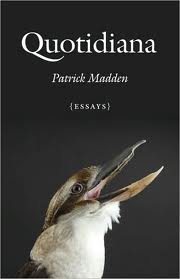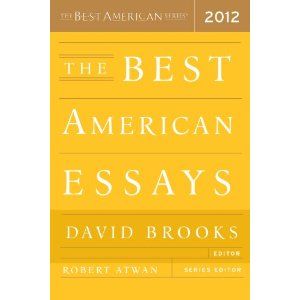
Not everyone begins their writing career with a book. In fact, it can really help your book to have established some online readership before the book comes out. The opportunities for writing online and reaching an audience continue to expand. Have you written essays you’d like to publish online to reach a large audience? Or have you thought of writing essays for online publication?
I recently attending an inspiring workshop at the URI’s Ocean State Summer Writing Conference with essayist Patrick Madden, author of Quotidiana, a collection of essays and a website by the same name. Patrick’s somewhat ADD-style was the jolt I needed to get out of my box and think more creatively. The class sparked a breakthrough in a story for an anthology I’d been struggling to write previously.
I asked Patrick to share with my readers some advice on publishing essays online (and offline, too).
Patrick: My first online essay was in Mississippi Review, which is now called Blip Magazine. Others have been in Brevity, Superstition Review, and the Huffington Post (the latter being an essay on the viability of essays). One essay that was in the Normal School is available from their website. Same thing with pieces in The Pedestrian and BYU Magazine.
And I’ve done two essays on eBay (auctioning a real bit of essay memorabilia, having friends write in to “Ask This Seller a Question,” and answering those questions in odd ways), though eBay purges old auctions after 90 days, so these are no longer viewable. When I began publishing, there weren’t many online venues, and most were seen as inferior to print, so my habit has been to submit to print journals. But in the past decade, online journals have come up very quickly in terms of quality and readership, so I’ve reversed my earlier position and am submitting more often now to online places.
 Lisa: I loved that e-bay auction essay–you had the entire audience laughing so hard at the URI Summer Writing Conference when you shared it.
Lisa: I loved that e-bay auction essay–you had the entire audience laughing so hard at the URI Summer Writing Conference when you shared it.Patrick: I typically write without considering where I’ll publish it, but I do try to write for “the educated lay reader,” the kind of person who reads literary journals, and probably the kind of person who knows and loves personal essays, maybe has some sense of the tradition going back to Montaigne. And as I’ve honed my skill, I’ve also narrowed my focus. I know fairly well which journals might be interested in something I’ve written and which will never be (because what I’ve read in them is so different from my style and/or because they’ve rejected me several times in the past). So I don’t waste submissions on places that simply don’t publish the kind of thing I’m writing.
Patrick: I always read the Best American Essays each year, and I look through the list of “notable essays” in the back, to get a sense of the journals that they’re pulled from. I also subscribe to about a dozen journals, and I have my favorite authors, so I track the places they’re publishing.
One of my favorite sites, where I do research and where I send my students, is www.newpages.com, which lists thousands of publications, many of them (probably more than half) online. It can be a bit daunting when you’re confronted with thousands of journals all at once, but you might do some searches for venues that publish your particular type of thing (say, “nature writing”) and then read some of what they have online, so you can decide if they’d be a good fit.
Patrick: I’ve never worked with an editor before submission, though I’ve worked with editors from particular journals once they’ve accepted my work. On the other hand, I’ve always worked with fellow writers to get their feedback on my writing, so I can know how best to revise. So if you don’t have that kind of group, then perhaps working with a professional editor from the early stages would be beneficial.
 Patrick: I don’t really do anything special, but I do post information to Facebook, where my friends can see it. This includes a Facebook group for my first book, so that means people who’ve already expressed interest in my writing. The comments on Facebook tend to be quick “congratulations,” so I haven’t yet figured out a good way to elicit more substantive comments.
Patrick: I don’t really do anything special, but I do post information to Facebook, where my friends can see it. This includes a Facebook group for my first book, so that means people who’ve already expressed interest in my writing. The comments on Facebook tend to be quick “congratulations,” so I haven’t yet figured out a good way to elicit more substantive comments.
I recommend against cluttering up your cover letter with any “teasers” about the piece you’re submitting, and stay away from anything that could be construed as bragging. You might mildly praise the journal you’re submitting to, mentioning that you’ve liked such-and-such piece by so-and-so. But don’t overdo that, either.
After you’ve clicked “submit,” you sit back and wait, sometimes for several months, and hope for the best. Note that most journals allow simultaneous submissions, so you can send the same piece to several journals and hope one of them will take it. Once it’s accepted somewhere, remember to withdraw it from all other venues.
Lisa: Any other advice for writers who want to submit essays online?

Patrick: I’ll just repeat: read widely, so you won’t be submitting blindly to journals that don’t fit your work. This will take a lot of time, and if you think of it only as “research” so you can publish your work, you may not enjoy it, but if you think of it as enjoying good literature, then you’ll gain two benefits.
Patrick Madden is the author of Quotidiana, finalist for the PEN Center USA award for creative nonfiction and winner of Independent Publisher and ForeWord Reviews book of the year awards. His essays have appeared recently in Fourth Genre, The Iowa Review, The Normal School, and in the Best American Spiritual Writing and Best Creative Nonfiction anthologies. He teaches at Brigham Young University and Vermont College, and curates www.quotidiana.org, an online anthology of classical essays.
Lisa: Have any questions for Patrick? Please share them below. And feel free to share your advice on writing essays and share links to your favorite essays here as well.


